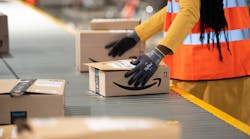The power of enterprise computing fits in the palm of your hand these days, and consumers are sharing in that power thanks to smart phones. Many of those consumers also have supply chain jobs and are responsible for supplying fellow consumers. That brings to mind a strange phenomenon that may be starting as sales of iPhone and iPad devices grow.
I read recently that e-tail giants such as Apple and Amazon will enjoy the lion's share of sales of these devices because consumers like ordering them online, directly from the source. That's a direct threat to brick and mortar outlets like Best Buy and Walmart. Yet I'll wager that most of the people who work in the back rooms and distribution centers of those stores not only ordered smart phones online, but are starting to use them for their jobs.
John Freund, CEO of Jump Technologies, told me people started out buying these devices for their own personal use but now they're looking for more and more apps for these devices, including ones that can help them on the job. Freund's company sprang up to help fill that niche, and he sees it as a benefit not only for these end users on-the-job, but for their employers as well.
In its strategy brief, Jump Technologies states that deploying a mobile app for field sales ordering is straightforward since “nearly all sales people today carry a smartphone.” A mobile app opens access to complete customer histories when these salespeople are at a customer site. The built-in camera turns the smartphone into a barcode reader to scan products to order them and/or record inventory levels.
“Sales staff can take the scans and then automatically calculate the order from the par levels set up by the customer or assemble the scanned items into an order,” the brief continues. “The orders then can be viewed or submitted directly to a billing system or sent via a fax or an email.”
Freund said that as his company researched the mobile device trend they also recognized an opportunity to put proof of delivery on a smart phone. The technology's ubiquity is making e-commerce fulfillment easier to justify, he added.
“Research shows you're more likely to go back to the house to get your phone than you are your purse or wallet,” he told me. “Since everybody carries these devices on them, why not leverage them as your proof of delivery solution? We ported our POD solution to iPhone and Android. The other nice piece of the platform is it's a smart phone with millions of applications out there like GPS tracking, which was a paid-for feature in our previous application, but is now free because we're just using another existing app at the app store that does GPS tracking.”
One of Jump's customers, Office City, in Redwood City, Calif., is a mid-tier office supply dealer who is using smart phones to place orders through the e-commerce site and is using Android tablet devices to get proof of delivery of those orders.
“The beauty that Steve Jobs set the bar on was to make these user interfaces very simple,” Freund summarized.
But I wonder if Jobs realized the supply chain conundrum these devices would cause. On one hand they make e-commerce easy to participate in for a consumer and an easy business platform for any small business to adopt. On the other hand, it's making these transactions so simple that the brick and mortar retail outlets hoping to have a merry Christmas-selling-season may actually lose sales of these devices to the e-tailers who also happen to be adopting them.
According to the Consumer Electronics Association, consumer expectations for technology spending are up more than 10 points from this time last year. The CEA also expects online sales to surge. And as long as Amazon offers unlimited shipping for a set fee, the mall and strip retailers will have a hard time competing against that as well.
Maybe they can offer their material handling and logistics employees discounts if they buy their iPhones and iPads off the shelf. On second thought, that might be like giving your housekeeper a broom for Christmas—and asking her to tidy up the house before guests arrive for Christmas dinner.
As hard as it is to attract good talent to work in a store or distribution center these days, if I were Best Buy or Walmart, I'd put cash in my people's pockets this Christmas. Chances are there's an iPhone there already.


